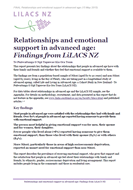This short report presents findings from the Life and Living in Advanced Age Cohort Study (LiLACS NZ) about the relationships people in advanced age have with family and friends and whether they feel they have emotional support.

Relationships and emotional support in advanced age: Findings from LiLACS NZ presents key findings about the relationships people have with their family and friends and whether they feel that emotional support is available to them for Māori (aged 80 to 90 years) and non-Māori (aged 85 years).
The findings are from a population-based sample of people in advanced age living in the Bay of Plenty, who are taking part in a longitudinal study of advanced ageing, called Life and Living in Advanced Age: a Cohort Study in New Zealand – Te Puā waitanga O Ngā Tapuwae Kia Ora Tonu (LiLACS NZ).
Overview of key findings
- Most people in advanced age were satisfied with the relationships they had with family and friends.
- Over 80 percent of people in advanced age reported having someone to provide them with emotional support.
- For men, the most common provider of emotional support was their spouse, and for women, their daughter.
- People who lived alone were less likely than people who lived with others to report having someone to give them emotional support.
- Māori (16%) were more likely than non-Māori (5%) to report having an unmet need for emotional support.
This information will assist the health sector, especially health policy analysts, planners and health care providers from district health boards, primary health organisations and Māori health providers to plan and deliver effective services to people in advanced age.
